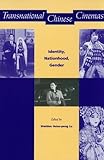Transnational Chinese Cinemas : Identity, Nationhood, Gender / Sheldon Hsiao-peng Lu.
Material type: TextPublisher: Honolulu : University of Hawaii Press, [1997]Copyright date: ©1997Description: 1 online resource (432 p.)Content type:
TextPublisher: Honolulu : University of Hawaii Press, [1997]Copyright date: ©1997Description: 1 online resource (432 p.)Content type: - 9780824865290
- 791.43/0951 21/eng
- PN1993.5.C4
- online - DeGruyter
| Item type | Current library | Call number | URL | Status | Notes | Barcode | |
|---|---|---|---|---|---|---|---|
 eBook
eBook
|
Biblioteca "Angelicum" Pont. Univ. S.Tommaso d'Aquino Nuvola online | online - DeGruyter (Browse shelf(Opens below)) | Online access | Not for loan (Accesso limitato) | Accesso per gli utenti autorizzati / Access for authorized users | (dgr)9780824865290 |
Frontmatter -- Contents -- List of Illustrations -- Preface -- Historical Introduction. Chinese Cinemas (1896–1996) and Transnational Film Studies -- Part I. Nation-Building, National Cinema, Transnational Cinema -- 1. Anti-Imperialism and Film Censorship During the Nanjing Decade, 1927–1937 -- 2. Two Stage Sisters: The Blossoming of a Revolutionary Aesthetic -- 3. From “Minority Film” to “Minority Discourse”: Questions of Nationhood and Ethnicity in Chinese Cinema -- 4. National Cinema, Cultural Critique, Transnational Capital The Films of Zhang Yimou -- Part II. The Politics of Cultural and National Identity in the Cinemas of Taiwan and Hong Kong -- 5. Constructing a Nation: Taiwanese History and the Films of Hou Hsiao-hsien -- 6. The Diaspora in Postmodern Taiwan and Hong Kong Film: Framing Stan Lai’s The Peach Blossom Land with Allen Fong’s Ah Ying -- 7. Breaking the Soy Sauce Jar: Diaspora and Displacement in the Films of Ang Lee -- 8. Transnational Action: John Woo, Hong Kong, Hollywood -- 9. Jackie Chan and the Cultural Dynamics of Global Entertainment -- Part III. Engendering History and Nationhood: Cross-Cultural and Gendered Perspectives -- 10. Reading Formations and Chen Kaige’s Farewell My Concubine -- 11. The New Woman Incident: Cinema, Scandal, and Spectacle in 1935 Shanghai -- 12. Gendered Perspective: The Construction and Representation of Subjectivity and Sexuality in Ju Dou -- 13. The Concubine and the Figure of History: Chen Kaige’s Farewell My Concubine -- 14. Narrative Images of the Historical Passion: Those Other Women— On the Alterity in the New Wave of Chinese Cinema -- Chinese Glossary -- Filmography -- Bibliography -- Notes on Contributors -- Index
restricted access online access with authorization star
http://purl.org/coar/access_right/c_16ec
Zhang Yimou's first film, Red Sorghum, took the Golden Bear Award in 1988 at the Berlin International Film Festival. Since then Chinese films have continued to arrest worldwide attention and capture major film awards, winning an international following that continues to grow. Transnational Chinese Cinemas spans nearly the entire length of twentieth-century Chinese film history. The volume traces the evolution of Chinese national cinema, and demonstrates that gender identity has been central to its formation. Femininity, masculinity and sexuality have been an integral part of the filmic discourses of modernity, nationhood, and history. This volume represents the most comprehensive, wide-ranging, and up-to-date study of China's major cinematic traditions. It is an indispensable source book for modern Chinese and Asian history, politics, literature, and culture.
Mode of access: Internet via World Wide Web.
In English.
Description based on online resource; title from PDF title page (publisher's Web site, viewed 02. Mrz 2022)


